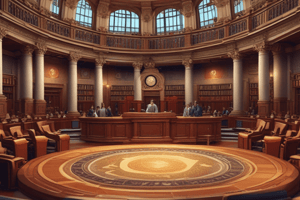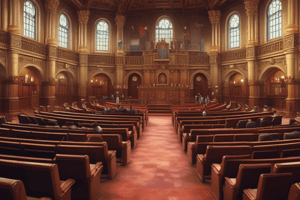Podcast
Questions and Answers
What is the difference between adoption and promulgation of legislation?
What is the difference between adoption and promulgation of legislation?
Adoption refers to the constitutionally-prescribed processes and procedures required for draft legislation to become law, while promulgation is the act of putting the legislation officially and legally into operation through publication.
What is the 'endless circle of invalidity' problem described in the text?
What is the 'endless circle of invalidity' problem described in the text?
The 'endless circle of invalidity' problem arises when the enabling Act does not have the force of law yet because the President needs to promulgate it, but the President does not have the authority to promulgate the Act without the enabling Act being in force.
What is the common law presumption regarding the application of legislation?
What is the common law presumption regarding the application of legislation?
The common law presumption is that legislation only applies to the future, and not retroactively before the legislation was promulgated and came into effect.
What is the 'Cats Entertainment' case mentioned in the text?
What is the 'Cats Entertainment' case mentioned in the text?
What is the 'Ex Parte Minister of Safety and Security: In re S v Walters' case about?
What is the 'Ex Parte Minister of Safety and Security: In re S v Walters' case about?
What is the 'Pharmaceutical Manufacturers Association of South Africa: In re Ex Parte President of the Republic of South Africa' case about?
What is the 'Pharmaceutical Manufacturers Association of South Africa: In re Ex Parte President of the Republic of South Africa' case about?
What is the legal principle that prevents unfair and unreasonable results from retroactive legislation?
What is the legal principle that prevents unfair and unreasonable results from retroactive legislation?
In the case of National Director of Public Prosecutions v Carolus, what type of retroactive effect was discussed?
In the case of National Director of Public Prosecutions v Carolus, what type of retroactive effect was discussed?
According to Section 35(3) of the Constitution, what two limitations are placed on retroactive legislation?
According to Section 35(3) of the Constitution, what two limitations are placed on retroactive legislation?
In the case of S v Ndiki, what principle was applied in determining whether retroactive effect was permissible?
In the case of S v Ndiki, what principle was applied in determining whether retroactive effect was permissible?
What are the two main exceptions to the presumption against retroactive effect mentioned in the text?
What are the two main exceptions to the presumption against retroactive effect mentioned in the text?
In the case of R v Sillas, what principle was established regarding retroactive effect and benefits to individuals?
In the case of R v Sillas, what principle was established regarding retroactive effect and benefits to individuals?




